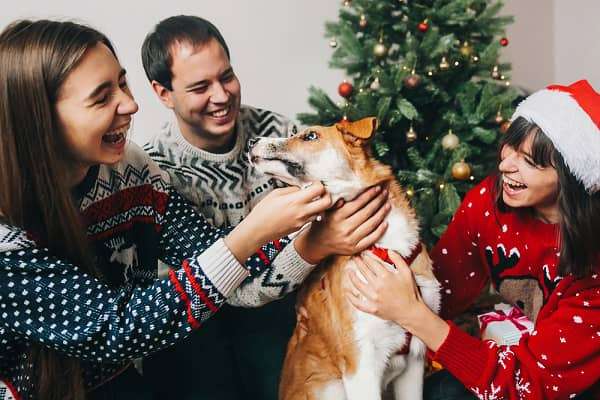The holiday with New Year’s around the corner is filled with celebrations that involve loud noises including New Year’s fireworks. Dogs and cats react to loud noises, having new people over, and fireworks.
Some pets aren’t phased by loud noises and boisterous activity but others get hurt by panicking and jumping through closed windows or bolting through doors to get away from the terrifying noise, activity and lights.
American pet advocacy groups point out that the number of escapees is so high during holiday and fireworks that Independence Day is the busiest day of the year in shelters — and that many pets get lost, injured, or killed.

You should know which clinics or emergency hospitals will be open during the holiday sand fireworks season, in case you need one, as this will help you avoid time delays and stress.
Your pets will do better if they’re not left home alone during fireworks and other loud events. That’s not always feasible, so think ahead before leaving them alone.
If having company over, consider providing them with a room they can have that is quiet and has an area such as a crate, a cat bed or even a comfortable place to hide that has food and water and for cats a litterbox)
Signs of anxiety can include pacing, trembling, panting, drooling, attention-seeking (vocalizing, pawing, nuzzling, and climbing on people), hiding, and bolting.
Escape attempts tend to involve hiding behind furniture, and staying in a basement or bathroom. Because the source of the noise is confusing, inside dogs may want to escape to the outside, and outside dogs may be frantic to get inside. Cats may bolt out an open door or remain hidden under furniture, nowhere to be found.
Nervous pets tend to drink more water, so keep more available than usual. Bring outside pets inside, so they can stay safe and have less chance of running away.
Keep your cats securely inside, and if your dog needs a potty break during the fireworks, take him outside on a leash, even in a fenced yard. Make sure all your pets are wearing an ID tag or a collar that contains your phone number. Tags and collars, while helpful, can fall off, so a microchip is even more useful in helping find a lost pet.
Drug-Free Remedies
What can you do to keep your frightened pet safe and calm? For many frightened pets, just staying in a crate or for cats having a box in a quiet room can increase the feeling of security and be helpful
Synthetic pheromone sprays and plug-in diffusers such as Feliway for cats and Adaptil (formerly called D.A.P.) for dogs are available at pet stores. These phermones imitate the properties of the natural pheromones of the lactating female that gives kittens or puppies a sense of well-being.
Some pets respond to pressure wraps, such as Thundershirts. The pressure on the body may have a calming effect.

Medication
It’s easier to prevent a fearful reaction than it is to reverse one. If your pet is nervous around loud, unexpected noises, a short-term sedative before the guests arrive and / or fireworks start may be a helpful tool.
Talk to your veterinarian ahead of time, so you can have something on hand to give your pet before the noise begins. Several medications are used for fireworks or thunderstorm phobias in dogs; however, do not use any of your own prescriptions because the dosage may be potentially harmful.
Some severely anxious pets that exhibit issues regularly not only when crowds or noise happens may benefit from drugs such as clomipramine, fluoxetine (generic Prozac) that increase the level of serotonin. For as needed medications that work quickly, Trazodone, Gabapentin or Xanax may start working in less than 1-2 hours, but its effect varies, so you should test it with your pet before the craziness starts.
The other drugs like Prozac can take several weeks, if not more, to build up to an effective level, so they are not a spur-of-the-moment fix. They are also not needed in a pet that is usually fine but only occasionally with specific events has anxiety.
You have many choices of how to help your pet cope with noises and firework stress. Talk to your veterinarian about what is best for your pet. Hopefully, everyone in the family will then be able enjoy the holiday season!


